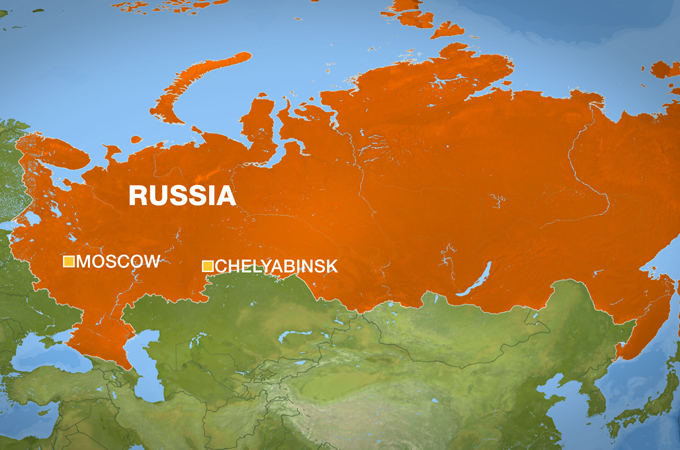Russia cleans up after meteor strike
Meteor was relatively small at 17 metres in diameter, but packed a punch weighing 10,000 tonnes.

Thousands of workers have been dispatched to Russia’s Chelyabinsk region, where a meteor streaking across the sky caused a shockwave that injured almost a thousand people, officials say.
The meteor sent fireballs crashing to Earth, smashed windows and set off car alarms all over Chelyabinsk, in the Ural Mountains region. Fragments of the rock fell on Friday in a thinly populated area of Chelyabinsk, the emergency ministry said in a statement.
Keep reading
list of 4 itemsCanada wildfires spur evacuation orders, warnings: What you need to know
Evacuation orders issued as wildfire grows near Canada’s Alberta oil patch
Energy summit seeks to curb cooking habits that kill millions every year
“A meteor disintegrated above the Urals [mountain range in central Russia], partially burning up in the lower atmosphere,” the local office of the national emergencies ministry said in a statement.
A team of six divers were inspecting the waters of the nearby Chebarkul lake for the presence of pieces of the meteor, the emergencies ministry said, while as many as 20,000 workers had been dispatched to help deal with the damage caused by the event.
“We have a special team working […] that is now assessing the seismic stability of buildings,” Vladimir Puchkov, the emergencies minister, told residents as he inspected the damage in the central Russian city. “We will be especially careful about switching the gas back on,” he said in televised remarks.
Residents on their way to work in Chelyabinsk heard what sounded like an explosion, saw a bright light and then felt a
shockwave when the incident occurred on Friday, according to a Reuters correspondent in the industrial city that is located about 1,500 km east of Moscow.
 |
The meteor raced across the horizon, leaving a long white trail in its wake which could be seen as far as 200km away in Yekaterinburg.
Car alarms went off, windows shattered and mobile phones worked only intermittently.
Mikhail Yurevich, Chelyabinsk governor, quoted by the RIA Novosti news agency, said at least 950 people were injured and that two-thirds of the injuries were light wounds from pieces of glass and other materials. In the city of Chelyabinsk alone, 758 people had required medical help, the city said in a statement on its website.
Vadim Kolesnikov, an interior ministry spokesperson, said that most people had sought treatment for injuries from glass broken by the explosions. Kolsenikov also said about 6,000sq ft of a roof at a zinc factory had collapsed.
The government said that almost 300 buildings were damaged including schools, hospitals and even an ice hockey stadium.
Yurevich said that the damage due to the explosion was estimated at about $33 million (1 billion rubles).
Blinding flash
Amateur video broadcast on Russian television showed an object speeding across the sky at about 9:20am local time (03:20 GMT), leaving a thick white contrail and an intense flash.
Television footage showed morning traffic grinding to a quick halt as a blinding flash lit up the blue sky, causing some to huddle in buildings for safety.
Windows were shattered on Chelyabinsk’s central Lenin Street and some of the frames of shop fronts buckled. A loud noise, resembling an explosion, rang out at around 9.20am. The shockwave could be felt in apartment buildings in the industrial city’s centre.
Officials said a part of the meteorite fell 80km from the town of Satki, itself 100km west of the regional centre.
|
|
| Local officials say this hole in the ice in Chebarkul lake was formed by Friday’s meteorite strike in Chelyabinsk region [Reuters] |
Schools were closed for the day across the region after the impact blew out windows of buildings and temperatures had plunged in central Russia to -18 degrees Celsius (0 degrees Fahrenheit).
The Chelyabinsk region is Russia’s industrial heartland, filled with factories and other huge facilities that include a nuclear power plant and the massive Mayak atomic waste storage and treatment centre.
A spokesman for Rosatom, the Russian nuclear energy state corporation, said that its operations remained unaffected.
The fall of such a large meteor, estimated as weighing dozens of tonnes, was extremely rare, while the number of casualties as a consequence of its burning up around a heavily inhabited area was unprecedented.
The office of the local governor said that a meteorite had fallen into a lake outside the town of Chebarkul in Chelyabinsk and television images pointed to a six-metre hole in the frozen lake’s ice.
It has yet to be finally confirmed, however, if meteorite fragments made contact with the Earth and there were no reports that any locals had been hurt directly by a falling piece of meteorite.
Friday’s meteor explosion appears to be one of the most stunning cosmic events above Russia since the 1908 Tunguska event, when a massive blast most scientists blame on an asteroid or a comet impact struck Siberia.